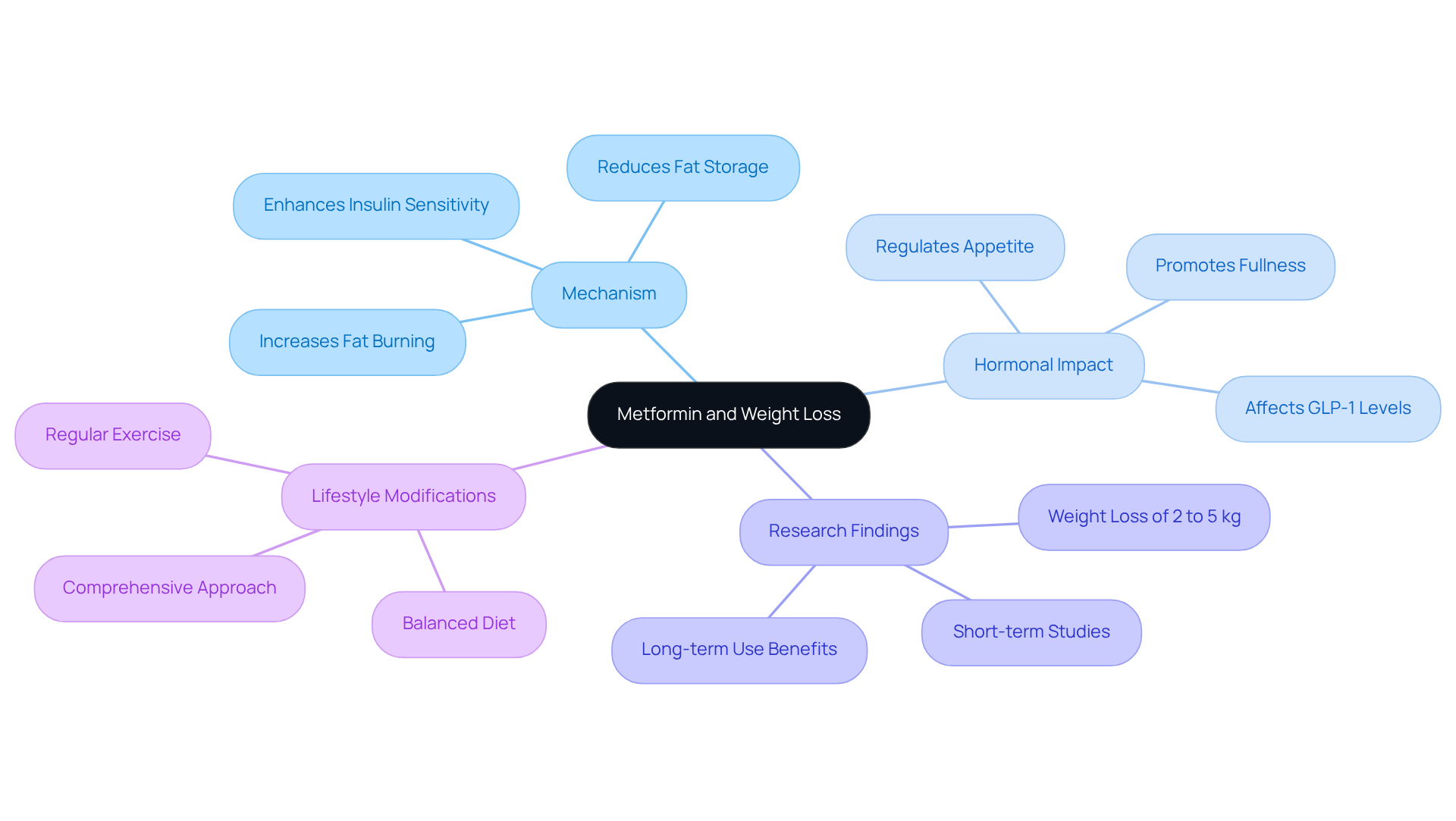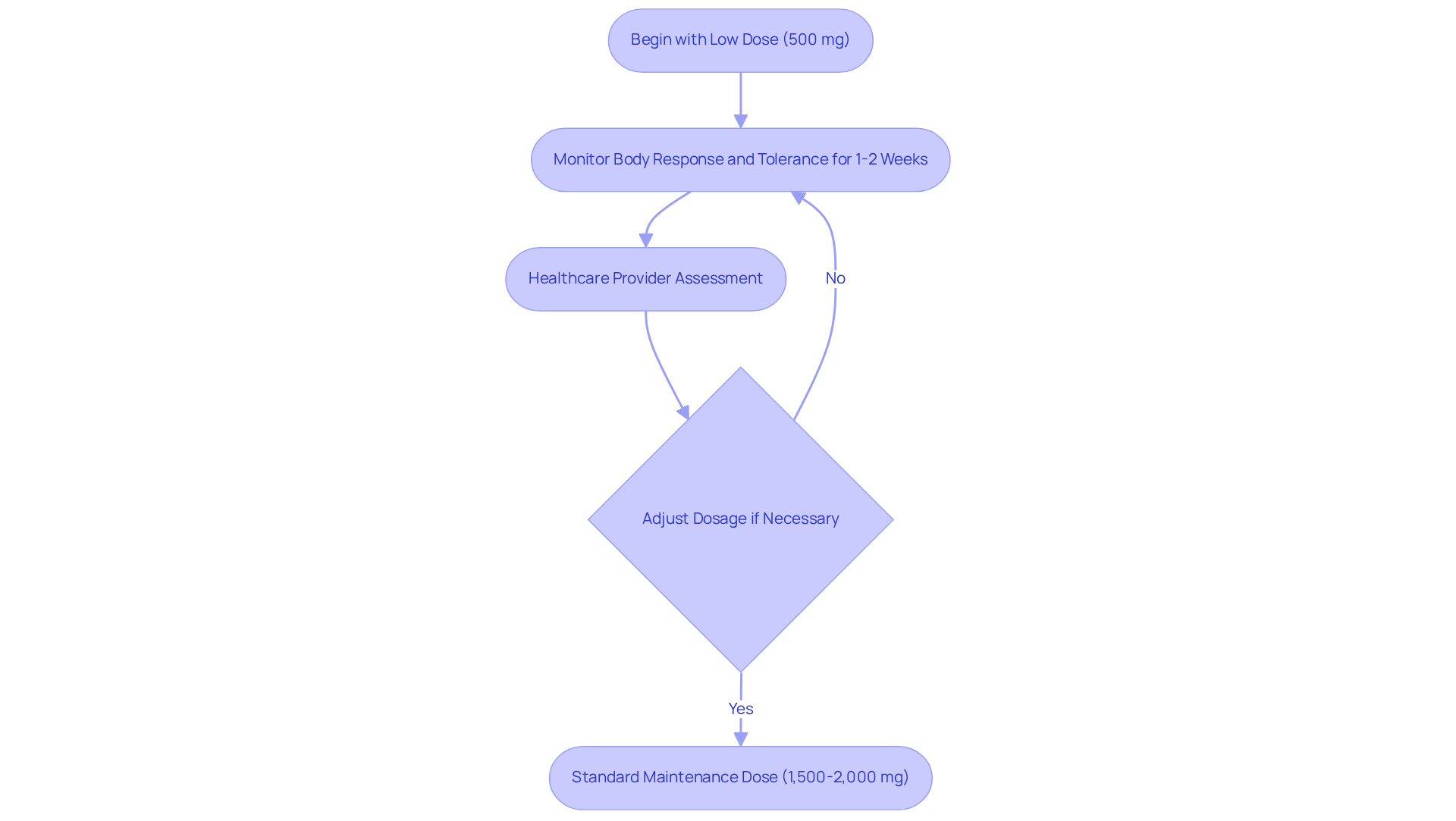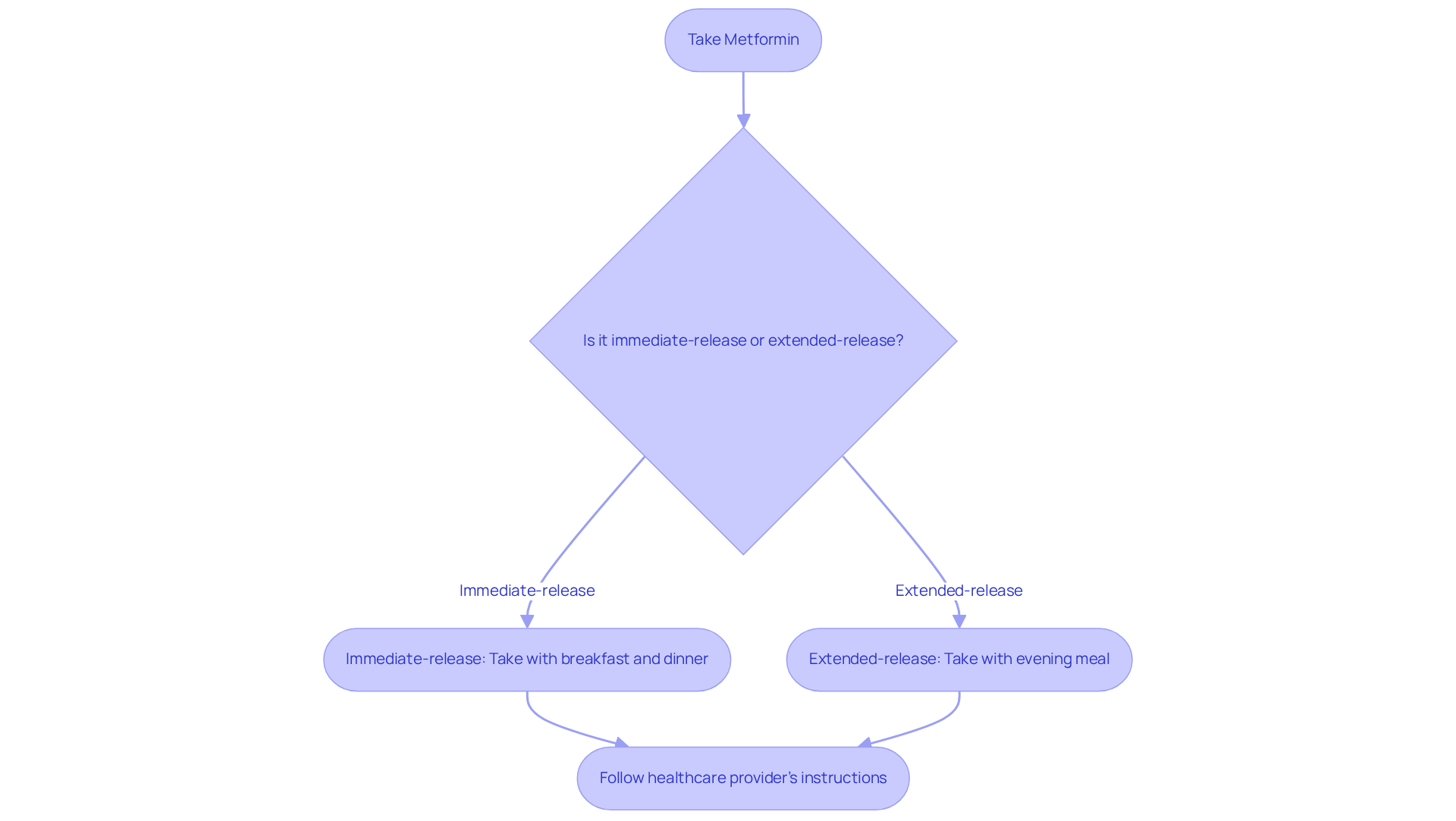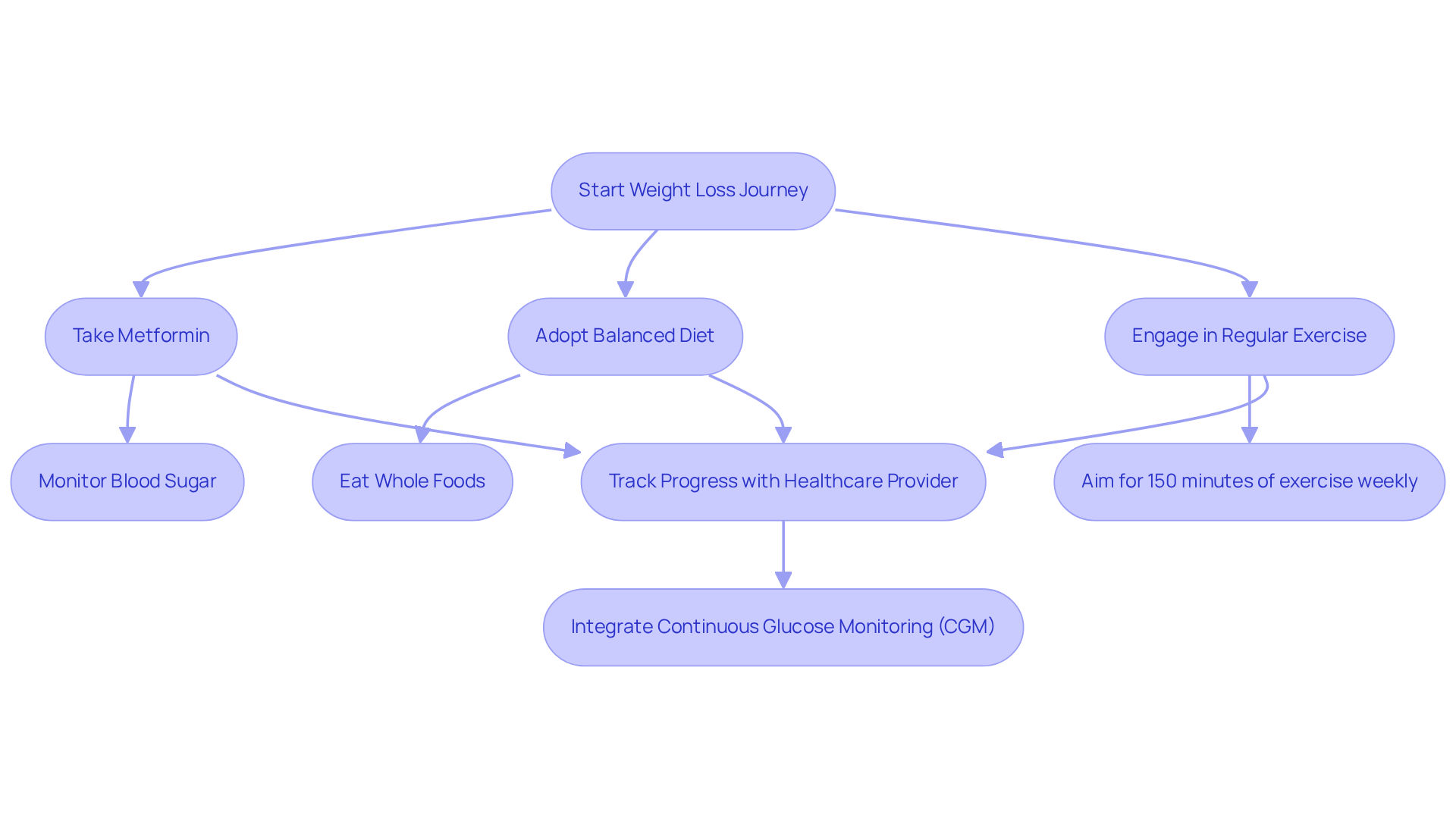Overview
This article serves as a caring guide on effectively using Metformin for weight loss, acknowledging the challenges you may face on this journey. It emphasizes the significance of proper dosing and timing, as well as the vital role of lifestyle changes, including diet and exercise. By understanding how Metformin enhances insulin sensitivity, we can see how it aids in fat reduction. Remember, the best results come when this medication is paired with a balanced lifestyle, leading to modest weight loss over time. Together, we can achieve your goals, and with the right support, you can navigate this path with confidence.
Introduction
Metformin has emerged as a pivotal tool, not only in managing type 2 diabetes but also in the quest for effective weight loss. By improving insulin sensitivity and regulating appetite, this medication offers a promising pathway for those struggling with excess weight. Yet, we understand that navigating the complexities of metformin dosing can feel daunting, especially when trying to balance medication with lifestyle changes.
How can you optimize your metformin regimen to achieve your weight loss goals while minimizing side effects? This guide is here to support you. It delves into essential strategies for mastering metformin dosing, ensuring that you are equipped with the knowledge to embark on your weight loss journey with confidence. Together, we can achieve your goals.
Understand Metformin and Its Mechanism for Weight Loss
Metformin dosing for weight loss is widely recognized for its role in managing type 2 diabetes, but it also holds promise for those looking to reduce body mass. By enhancing insulin sensitivity, Metformin helps the body utilize glucose more effectively, which can lead to reduced fat storage and increased fat burning. This makes it a valuable ally in your journey toward better body composition. Moreover, Metformin impacts hormones like GLP-1, which plays a significant role in appetite regulation, often leading to a greater sense of fullness.
Research indicates that short-term studies show modest reductions in body mass, typically between 2 to 5 kg (approximately 4 to 11 lbs), particularly among overweight individuals facing insulin resistance. Extended use of Metformin may also help prevent increases in body mass, especially for those at risk of developing type 2 diabetes. It’s important to note that while Metformin can assist in reducing body mass, its effectiveness is greatly enhanced when combined with lifestyle changes, such as a balanced diet and regular exercise.
Endocrinologists emphasize that the drug’s ability to improve insulin sensitivity is a key factor in its effectiveness for weight management. As one expert pointed out, “Enhanced insulin sensitivity can decrease fat storage.” This highlights the importance of understanding how Metformin works, especially for those considering metformin dosing for weight loss in their strategy. Remember, a comprehensive approach that combines medication with healthy lifestyle modifications is vital. Together, we can achieve your goals, and we’re here to support you every step of the way.
Determine the Right Metformin Dosage for Your Needs
If you’re considering metformin dosing for weight loss, it’s important to begin with a low dose, typically 500 mg taken once or twice daily. This initial dosage helps your body adjust to the medication comfortably. After one to two weeks, your healthcare provider can assess your tolerance and blood sugar levels, making any necessary adjustments to your dosage.
The standard maintenance dose usually falls between 1,500 mg and 2,000 mg per day, divided into two or three doses. Regularly monitoring how your body responds is crucial, and maintaining ongoing consultations with your healthcare provider will ensure that any adjustments are made to support your journey. Remember, the goal is to find metformin dosing for weight loss that effectively aids in reducing body mass while minimizing potential side effects.
Research indicates that individuals can achieve an average weight reduction of 2 to 8 pounds over one to four years when using this medication alongside lifestyle modifications. Isn’t it encouraging to know that with the right approach, positive changes are within reach? Healthcare providers also stress the importance of tracking your progress and adjusting dosages as needed to optimize results. Together, we can work towards achieving your weight loss goals with care and support.
Administer Metformin Effectively: Timing and Meal Coordination
To help minimize gastrointestinal side effects such as nausea and diarrhea, it’s important to take this medication with meals. For those using immediate-release formulations, we generally recommend taking the medication with breakfast and dinner. If you’re on extended-release medication, taking it with your evening meal is often the most effective approach. This timing not only helps maintain stable blood sugar levels throughout the day but also enhances the medication’s effectiveness. Remember, always follow your healthcare provider’s instructions regarding timing and dosage adjustments tailored to your individual needs. We’re here for you on this journey, and together, we can achieve your health goals.
Combine Metformin with Diet and Exercise for Optimal Results
To enhance the benefits of metformin dosing for weight loss, it’s important to embrace a balanced diet and a consistent exercise regimen. With Minimal’s tailored coaching and Prescription and Clinician Support, you can embark on this journey with confidence. Focus on whole foods, such as fruits, vegetables, lean proteins, and whole grains, while minimizing processed foods and sugars.
Imagine how customized fitness programs, encompassing both aerobic and strength training activities, can boost the effectiveness of your medication. By enhancing insulin sensitivity and encouraging fat reduction, metformin dosing for weight loss can help you take meaningful steps toward your health goals. Aim for at least 150 minutes of moderate-intensity exercise each week. Studies suggest that participants who combined metformin dosing for weight loss with lifestyle changes experienced an average BMI reduction of one point within six months (source: Vively).
Additionally, metformin dosing for weight loss when taken with meals can help reduce side effects. Regular check-ins with your healthcare provider at Minimal can help track your progress and make necessary adjustments to your treatment plan. Have you considered integrating continuous glucose monitoring (CGM)? It can offer real-time insights on how your diet and exercise affect your blood sugar levels, further enhancing your journey toward slimming.
With Minimal’s holistic weight loss solutions, you can empower your health journey through personalized care and comprehensive support. Remember, we’re here for you, and together, we can achieve your goals.
Conclusion
Metformin can be a powerful ally in your weight loss journey, especially if you’re facing challenges with insulin resistance. By enhancing insulin sensitivity and regulating appetite through hormonal pathways, Metformin can lead to meaningful changes in body composition when used correctly. However, to truly unlock its potential, it’s essential to integrate it into a comprehensive strategy that includes a balanced diet and regular physical activity.
Starting with a low dosage of Metformin and gradually adjusting under the guidance of a healthcare provider is crucial. This thoughtful approach can pave the way for success. Research shows that when combined with lifestyle modifications, Metformin can help individuals achieve an average weight reduction of 2 to 8 pounds over time. Additionally, taking Metformin with meals can ease side effects, creating a smoother experience as you navigate your weight loss journey. By incorporating tailored dietary choices and exercise routines, you can enhance the benefits of Metformin, making your weight loss efforts more effective and sustainable.
Remember, the journey to weight loss with Metformin extends beyond the medication itself; it’s about embracing a holistic approach that includes mindful eating and physical activity. We encourage you to take proactive steps:
- Consult with your healthcare provider
- Track your progress
- Adopt a lifestyle that aligns with your weight loss goals
Together, we can achieve your goals, making a healthier body composition a more attainable reality and paving the way for improved overall well-being.
Frequently Asked Questions
What is Metformin and how does it aid in weight loss?
Metformin is a medication primarily used to manage type 2 diabetes, but it also helps with weight loss by enhancing insulin sensitivity, allowing the body to utilize glucose more effectively, which reduces fat storage and increases fat burning.
How does Metformin affect appetite regulation?
Metformin impacts hormones like GLP-1, which plays a significant role in appetite regulation, often leading to a greater sense of fullness and potentially reducing overall food intake.
What are the typical results from using Metformin for weight loss?
Short-term studies indicate that Metformin can lead to modest reductions in body mass, typically between 2 to 5 kg (approximately 4 to 11 lbs), especially among overweight individuals with insulin resistance.
Can Metformin prevent weight gain?
Yes, extended use of Metformin may help prevent increases in body mass, particularly for individuals at risk of developing type 2 diabetes.
How can the effectiveness of Metformin for weight loss be maximized?
The effectiveness of Metformin is greatly enhanced when combined with lifestyle changes, such as maintaining a balanced diet and engaging in regular exercise.
Why is understanding insulin sensitivity important when considering Metformin for weight management?
Understanding insulin sensitivity is crucial because Metformin improves insulin sensitivity, which can decrease fat storage, making it a key factor in its effectiveness for weight management.
What approach should be taken when using Metformin for weight loss?
A comprehensive approach that combines Metformin with healthy lifestyle modifications, such as diet and exercise, is vital for achieving weight loss goals.





















